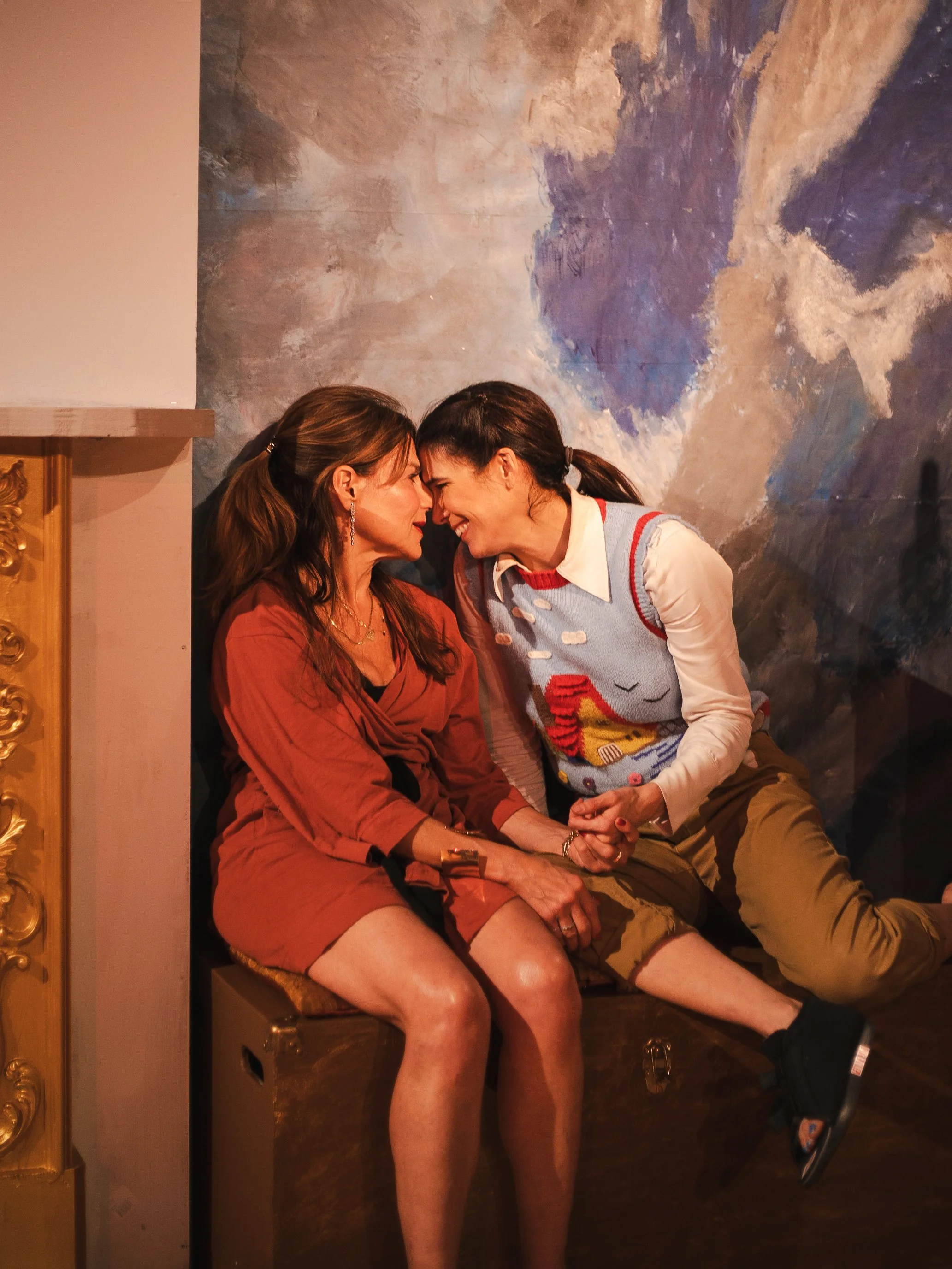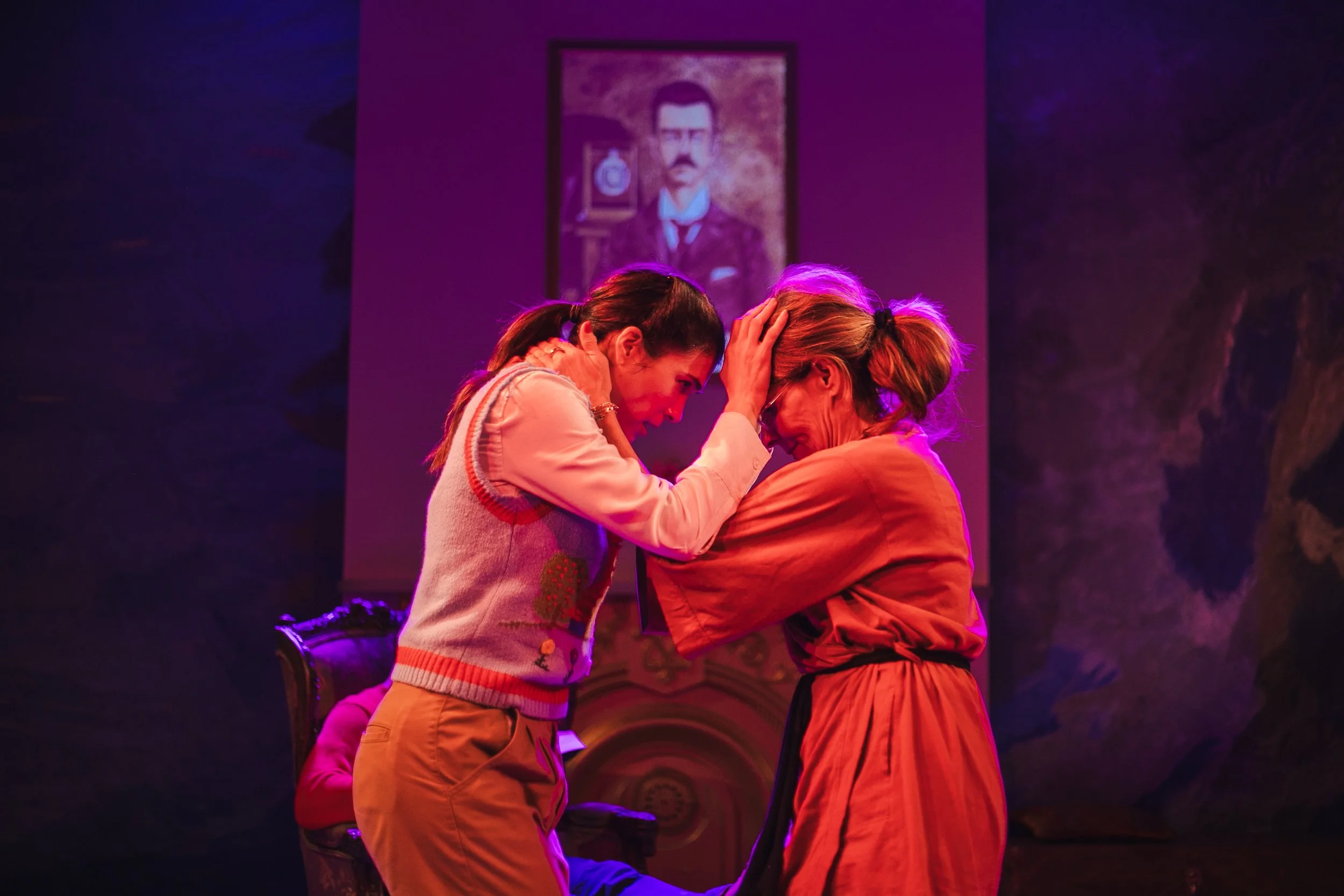THE WHOLE OF TIME
Written by Romina Paula; Directed by Tony Torn
The Brick Theater | 579 Metropolitan Ave, Brooklyn, NY 11211
August 25 - September 20, 2025
Photo Credit: Catalina Recalde
It’s fascinating to watch the American family drama, that hothouse genre of domestic collapse, be taken up not merely as homage but as an incantation, as Argentine playwright Romina Paula does in The Whole of Time. First staged in 2009 and now being revived in a larger venue after being given a nervy, glinting English-language production under the direction of Tony Torn last year, performed in Torn’s apartment, once the home of his parents Geraldine Page and Rip Torn, two legendary actors who made careers of bringing to life the work of modern American playwrights. Paula’s play doesn’t so much tip its hat to the American canon as it takes a long, trembling drag from its cigarette, stubs it out on its forearm, and asks, “Is that all you’ve got?”
Yes, the ghosts are all here, Tennessee Williams, Edward Albee, Sam Shepard—crowded around the edge of the frame, nodding their approval as the family at the heart of The Whole of Time chews each other to pieces with the kind of ferocious affection that leaves scars. Williams’s Glass Menagerie is the most explicit text in conversation, but the echoes go far deeper than that: the animalistic hunger, the malicious make-believe, the familial toxicity—all find their way into the room like cigarette smoke you can’t quite clear out.
But Paula’s dramaturgy is more kaleidoscope than mirror. Her quartet of characters refracts these influences into something stranger, slipperier, more volatile. The central constellation—a mother, her adult son and daughter, and an interloping friend—might seem familiar, but here the gravitational center refuses to hold. Where Williams’s Amanda Wingfield rules over her household with brittle desperation, Paula’s Ursula (played with a sloshing blend of menace and charm by Ana B. Gabriel) is a woman not merely clinging to faded fantasies but actively constructing new ones, night after night, sometimes over drinks, sometimes over bodies.
Her son, Lorenzo (a magnetic Lucas Salvagno, by turns coquettish and wounded), wears glittery shirts and reads Melville’s Moby Dick like it’s a sacred text. He lives with his mother and sister in what seems to be an economically buffered vacuum—working at a restaurant not out of necessity but to pass the time, like a trust-fund Ishmael waiting for the whale. His sister, Antonia (a fierce, if occasionally petulant, Josefina Scaro), channels Laura Wingfield but replaces fragility with a radical anti-capitalist agency. She’s housebound, yes, but by choice—choosing stasis over submission, home over hustle. Her refusal to engage with the outside world is not framed as failure, but as a philosophical stance, a quiet rebellion.
Into this bubbling stew walks Maximiliano (a beautifully grounded Ben Becher), a bartender with a Brando swagger and the soul of a working-class philosopher. Maxi isn’t just the outsider; he’s the witness, the confessor, the sacrificial lamb. His vocabulary may lack the precision of the others’—his speech is riddled with “like”s and “um”s—but his emotional clarity cuts through their aesthetic fog. He is, in a word, real. And in this house of mirrors, reality is both disruptive and dangerous.
The play pulses with erotic tension from the moment it begins—with Lorenzo, bare-chested in a shearling coat, singing Marco Antonio Solís’s Si no te hubieras ido (There’s Nothing More Difficult Than Living Without You) under a wash of electric blue, while Antonia feeds him lines like a lover or a director or perhaps a bit of both. It’s a moment of exquisite discomfort, laden with incestuous suggestion and theatrical artifice, and it sets the tone for the rest of the evening. That Lorenzo and Antonia nearly kiss in the scene that follows doesn’t feel like a shock—it feels like a continuation, an inevitable consequence of a house where emotional and sexual boundaries have long since frayed.
Director Torn leans hard into this aesthetic of distortion and desire. The staging is as tight as a noose: what last year positioned the audience packed into a room so small you could smell the actors’ sweat, and feel the damp heat of their longing, now places them in a roomy blackbox setting, but the claustrophobia still hangs over the room. Frida Kahlo’s father, projected in sepia above the action, stares us down like a ghostly patriarch judging the family’s sins—and ours. The references swirl like sediment in a glass of mezcal: Moby Dick, glam rock, 1980s power ballads, The Stooges, Kahlo’s paintings. It’s a heady cocktail, and it leaves the audience swaying.
Midway into such a fluid piece, the emotional stakes crystallize. A conversation between Maxi and Antonia about what it means to live a “normal” life becomes the play’s philosophical heart, and its emotional fulcrum. What begins as tentative flirtation veers into a scene of blurred consent, desire clashing with power in a way that feels both deeply human and theatrically volatile. Torn scores the scene with The Stooges’ I Wanna Be Your Dog—a choice that underscores the savagery lurking beneath the surface, even as it indulges in the production’s glam-rock fetish.
By the time Ursula returns from a date that is not quite a date, reeling and drunk, the emotional weather has turned: every character on stage seems both on the verge of breakdown and in the thrall of some terrible clarity. The family is drawn back into their old configurations, like iron filings to a magnet—but everything has shifted. The outsider, as ever, sits alone.
Torn’s cast is uniformly strong, though it is Salvagno and Becher who most fully inhabit their contradictions. Salvagno’s Lorenzo is a wounded peacock—vain, romantic, theatrical, tragic. Becher’s Maxi, in contrast, offers a quiet resistance to the family’s vortex: his performance is all understatement and restraint, which in this production reads as radical honesty. The women occasionally drive into a register of petulance, their performances shaded with an air of quiet sulkiness.
In the end, the family unit remains intact, if only just—huddled together, like survivors of an emotional explosion they may or may not have caused. Maxi, isolated, seems already forgotten, or perhaps ejected. We are left to wonder: has this cycle played out before? Will it happen again? Or has something truly, irrevocably shattered?
Like the best of its ancestors—Who’s Afraid of Virginia Woolf, The Curse of the Starving Class, The Glass Menagerie, to name a brilliant few—The Whole of Time offers no easy answers. What it offers instead is something far more electric: a theatrical space where love is indistinguishable from violence, where time is both elastic and crushing, and where what is meant to be the solace of the family is still the most dangerous place of all. In a world this raw, sometimes the only thing to do is put on a sparkly shirt, sing your broken heart out, and let the light catch the tears on your cheek.
Click HERE for tickets.
Review by Tony Marinelli.
Published by Theatre Beyond Broadway on September 4, 2025. All rights reserved.







